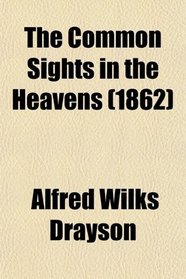Search -
The Common Sights in the Heavens (1862)
The Common Sights in the Heavens - 1862
Author:
Purchase of this book includes free trial access to www.million-books.com where you can read more than a million books for free. This is an OCR edition with typos. Excerpt from book: nearer to the earth than about four hundred million miles. Jupiter. The Earth. The receptability of light of this planet must be very great, for he appears... more »
Author:
Purchase of this book includes free trial access to www.million-books.com where you can read more than a million books for free. This is an OCR edition with typos. Excerpt from book: nearer to the earth than about four hundred million miles. Jupiter. The Earth. The receptability of light of this planet must be very great, for he appears... more »
ISBN-13: 9780217580151
ISBN-10: 0217580157
Publication Date: 8/15/2009
Pages: 82
Rating: ?
ISBN-10: 0217580157
Publication Date: 8/15/2009
Pages: 82
Rating: ?
0 stars, based on 0 rating




